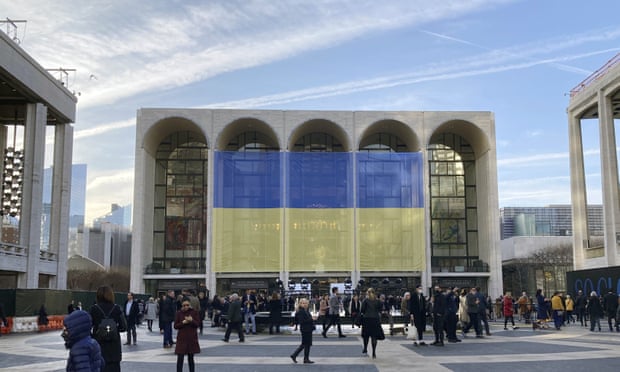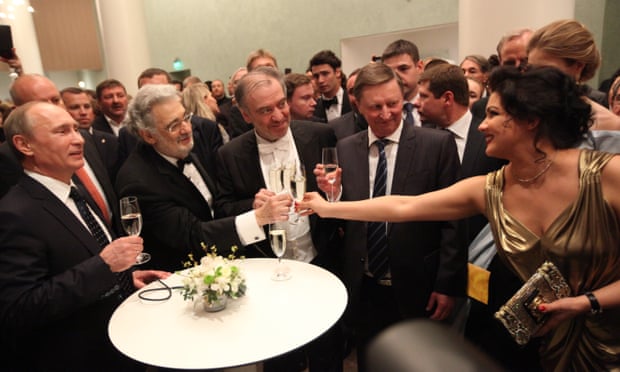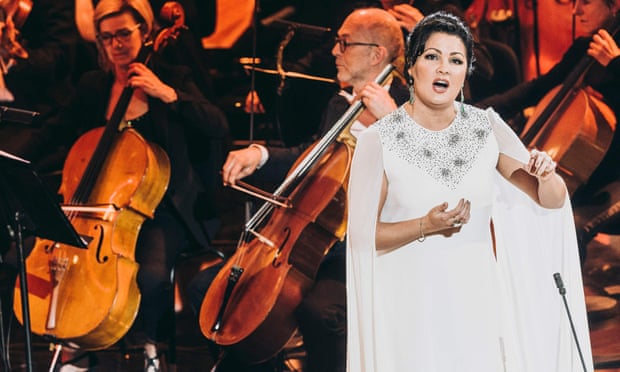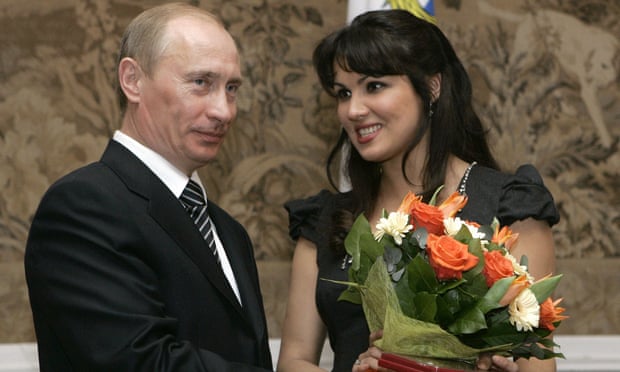On the opening night of Anna Netrebko’s first run of performances at the Vienna State Opera since the Kremlin launched its war in Ukraine, the Russian soprano was met with boos as she made her entrance on stage. Outside, a group of Ukrainians protested against her presence.
By the second of Netrebko’s three-date run as Mimi in Puccini’s La Bohéme, the full house cheered her first aria so loudly and enthusiastically that if there were any boos, it was impossible to hear them.
The mixed reactions are symbolic of her current performing life. Considered by many to be the greatest living soprano, Netrebko has for more than a decade been able to sell out opera houses around the world as soon as her name is announced.
But since Russia invaded Ukraine in February, attention has shifted away from her singing and focused more on her perceived closeness to Vladimir Putin. The Metropolitan Opera in New York pulled Netrebko from a run of Turandot in April, replacing her with a Ukrainian soprano. Other invitations dried up.
The debate over Netrebko has been part of a broader discussion in arts, culture and sport over how much individual Russians should bear responsibility for the actions of their government.
The soprano’s supporters have pointed to her condemnation of the war in a statement she issued in March. “I expressly condemn the war on Ukraine and my thoughts are with the victims of this war and their families,” Netrebko wrote at the time. She said she had only met Putin on a handful of occasions, and added: “I am not a member of any political party nor am I allied with any leader of Russia.”
Others note she carefully avoided direct criticism of Putin in the statement, and she later expressed frustration she had been forced to speak out at all.
The statement was enough to attract fury inside Russia. “She has a voice, but not a conscience,” wrote Vyacheslav Volodin, the chair of the Duma, describing Netrebko’s words as a “betrayal”.
A concert in Novosibirsk was cancelled, as the theatre accused her of being more interested in ticket sales abroad than “the fate of the motherland”. Netrebko has not visited Russia since. This is proof enough, say her supporters, that she has gone out on a limb to oppose the war.
Miguel Esteban, her general manager, said: “She has already put herself and her family and friends living in Russia at risk by saying she condemns the war and by defining the limited extent of her relationship with Vladimir Putin. To go even further and to condemn Putin would be too much to ask of her.”
Bogdan Roščić, the director general of the Vienna State Opera, agreed. “Ms Netrebko condemned the war in quite clear terms” in March, he said, and as such she was welcome to sing at the theatre. Roščić also cautioned against forcing Russian artists into condemning Russia’s government.
“Nobody can exist outside politics. I also reject the notion that especially gifted people should be forgiven things lesser mortals are held accountable for. But that is not the same thing as construing a duty for artists to pontificate on morals or to have those morals approved by pitchfork mobs on Twitter,” he said in written answers to questions.
Many agree with Roščić. In May, Netrebko sang to a full house at La Scala in Milan, and she has slowly reappeared on schedules across Europe. But she is not welcome everywhere. A recent concert in Stuttgart was cancelled after the local authorities refused to allow it to go ahead. Most notably, the Metropolitan Opera has made a very public declaration that Netrebko will not be coming back.

“She is inextricably associated with Putin,” its general manager, Peter Gelb, told the New York Times in June. “She has ideologically and in action demonstrated that over a period of years. I don’t see any way that we could possibly do a backflip.”
The public attack has irritated Netrebko, who has filed a labour grievance against the Met through the American Guild of Musical Artists. “There was a perception issue and she had to address it. But she did so voluntarily; it is not because a certain gentleman from the Met demanded it,” said Esteban.
Netrebko began her career at St Petersburg’s Mariinsky theatre, whose director, Valery Gergiev, she has called her “godfather in music”. The conductor has been a staunch Putin supporter for years, on several occasions playing concerts for the Russian military.
Netrebko has been pictured on occasion with Putin, such as in 2008 when she was awarded an honorary title by the Russian president. She has long been an Austrian citizen and resident, but her name was on a list of cultural figures who endorsed Putin’s election run in 2012, and in 2014, she donated money to the Donetsk opera house in Ukraine when the territory was controlled by Russian proxy forces.

The singers were grateful for the aid, but Netrebko posed with a separatist politician and flag when making the donation, causing controversy. She later said she had not realised what the flag stood for.
The pictures resurfaced and caused renewed controversy after the invasion in February.
Liudmyla Monastyrska, the Ukrainian soprano who replaced Netrebko in Turandot at the Met, said she wanted her to be able to sing but was disappointed by her equivocal stance.
“I don’t think you can just be evasive and say you’re outside politics. I was also a long way from politics and from all these political games for many years, but now we have a terrorist state, and you have to pick sides,” Monastyrska said in July, where she was singing with the Ukrainian Freedom Orchestra, a grouping of musicians from all over Ukraine which had formed for a special global tour.

Monastyrska said she spoke with Netrebko in Naples in the days before Putin’s invasion, as both sopranos were singing the part of Aida at the city’s opera house. The talk of war was in the air, and Netrebko had said she really hoped there would be no conflict.
“Then, after, not to say anything publicly is strange … I think Anya should have said something immediately, on the first day. She’s the No 1 soprano in the world, and it takes her a month to say anything clearly, and then again she half takes it back.”
In Vienna on Sunday, it was clear that for many in the audience, Netrebko’s voice still trumps her political views. When she emerged back on to the stage at the curtain call they jumped to their feet and whooped. Netrebko pressed her hands to her heart, visibly delighted, and soaked up the applause.

